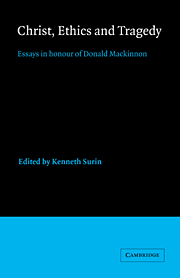Book contents
- Frontmatter
- Contents
- Preface
- Donald MacKinnon
- 1 Theological rhetoric and moral passion in the light of MacKinnon's ‘Barth’
- 2 Idealism and realism: an old controversy dissolved
- 3 Modes of representation and likeness to God
- 4 MacKinnon and the parables
- 5 Trinity and ontology
- 6 Some aspects of the ‘grammar’ of ‘incarnation’ and ‘kenosis’: reflections prompted by the writings of Donald MacKinnon
- 7 Tragedy and atonement
- 8 MacKinnon and the problem of evil
- 9 Pride and international relations
- 10 ‘Between purgation and illumination’: a critique of the theology of right
- 11 On being ‘placed’ by John Milbank: a response
- Index of names
- Index of subjects
4 - MacKinnon and the parables
Published online by Cambridge University Press: 11 March 2010
- Frontmatter
- Contents
- Preface
- Donald MacKinnon
- 1 Theological rhetoric and moral passion in the light of MacKinnon's ‘Barth’
- 2 Idealism and realism: an old controversy dissolved
- 3 Modes of representation and likeness to God
- 4 MacKinnon and the parables
- 5 Trinity and ontology
- 6 Some aspects of the ‘grammar’ of ‘incarnation’ and ‘kenosis’: reflections prompted by the writings of Donald MacKinnon
- 7 Tragedy and atonement
- 8 MacKinnon and the problem of evil
- 9 Pride and international relations
- 10 ‘Between purgation and illumination’: a critique of the theology of right
- 11 On being ‘placed’ by John Milbank: a response
- Index of names
- Index of subjects
Summary
Discussions of particular parables and of the concept of parable itself are scattered throughout the writings of Donald MacKinnon; and in one case, in the Gifford Lectures, it becomes one of the central themes of a book. But my purpose in the present essay is not so much the examination of these rich and varied individual passages, as the isolation of some major themes which, it seems to me, recur in his thought about the parables – both in his writings and lectures and in informal remarks. How far I am right in seeing the ideas I shall thus set in relief as the basic ones in his thinking in this area I am unsure. What is clear to me is that the three themes that for me run through his work here are themes of great importance, and constitute, if properly appreciated, a significant corrective to a great deal of the kind of interpretation of the parables with which we are all familiar – the tradition of parable interpretation inaugurated by Adolf Julicher and modified and developed by authors such as Dodd and Jeremias. They are also themes the depth of whose significance I believe I have learnt from MacKinnon, who indeed first stimulated my interest in the nature of the parables when I was working as a student under his supervision many years ago.
- Type
- Chapter
- Information
- Christ, Ethics and TragedyEssays in Honour of Donald MacKinnon, pp. 49 - 70Publisher: Cambridge University PressPrint publication year: 1989

